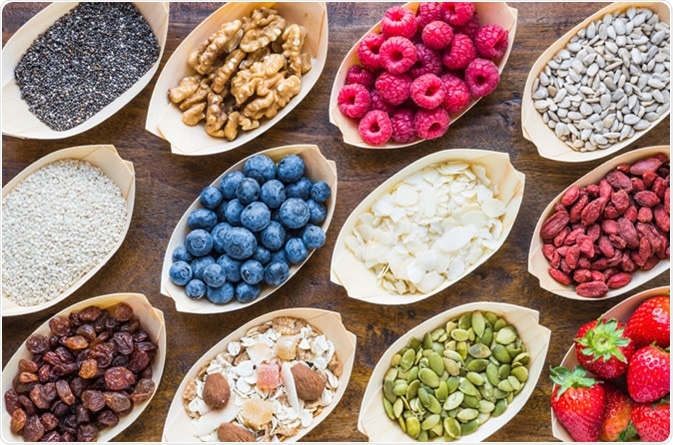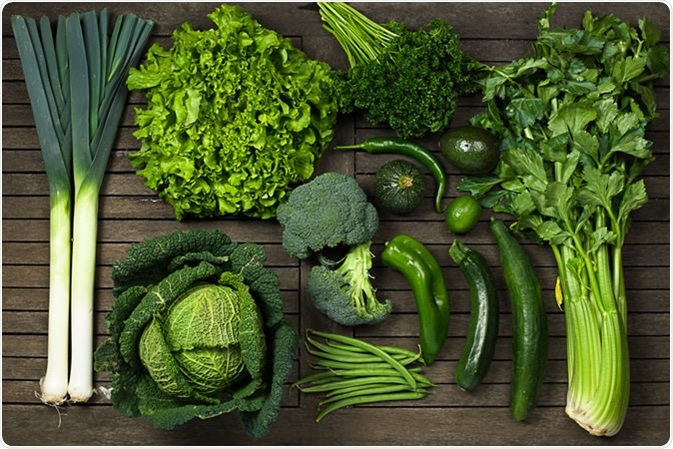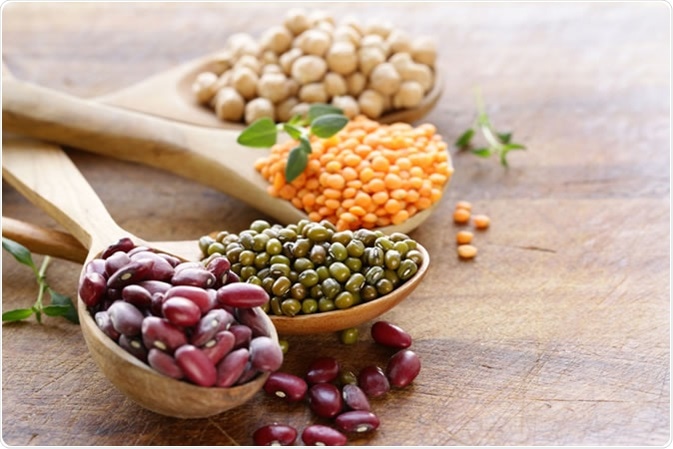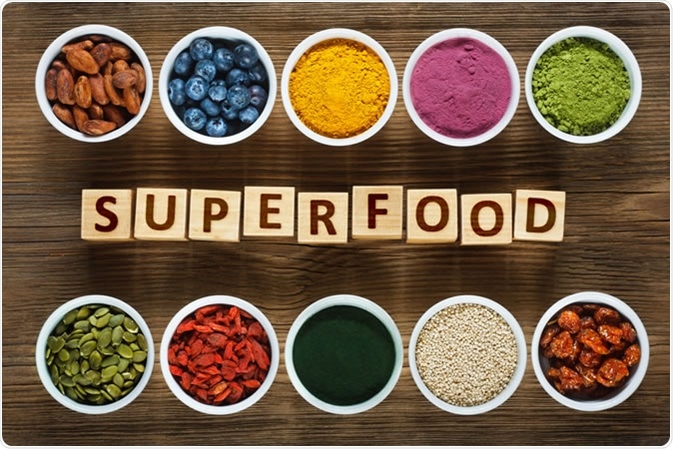Skip to:
The term ‘superfood’ is used to define food items that have high levels of particular nutrients (antioxidants, vitamins, or minerals) and extra health benefits. However, scientific evidence in support of the real health benefits of these foods is mostly inconclusive.

Fruits, berries, nuts - Image Credit: Leonoria / Shutterstock
What are superfoods?
There is no scientifically-approved definition for superfoods. Food gets labelled as ‘superfood’ when claims are made that it provides multiple health benefits simultaneously or helps prevent a disease.
Superfoods became popular in the early 20th century whenthe United Fruit Company used the term as a marketing strategy. The company actively marketed the health benefits of bananas. They encouraged people to include these fruits in their daily diet on the basis that they were cheap, easily available, nutritious, easily digestible, and can be consumed in both cooked and uncooked forms.
Afterward, the idea that a banana is a superfood became more popular when physicians started using the fruit to treat serious health conditions, such as celiac disease and diabetes. The American Medical Association also endorsed bananas as a daily consumable food.
Research indicates that when a food item is labeled as a superfood this translates into super sales. This raises the question as to whether these superfoods really do provide optimal nutritional benefit rather than a label used as a sale booster by the food industry.
How to enrich our daily diet with superfoods?
While choosing the best nutrients for diet, it is always important to remember that no single food is enough to provide all essential nutrients required for healthy living. Too much focus on superfoods can mislead a person and divert his/her attention from other healthy foods that are more enriched nutritionally.
According to the US Dietary Guidelines (2015 – 2020), for a healthy eating pattern, one should include in diet essential nutrients from a variety of food groups, while paying attention to calorie intake limits. Certain dietary patterns including Mediterranean diet have shown significant health benefits in terms of reducing the risk of chronic diseases.
Although most of the superfoods are over-hyped, certain food items must be acknowledged separately for their immense health benefits and nutritional values. Following is the list of foods that offer these benefits:
Berries – are high in dietary fiber, antioxidants, and disease-fighting nutrients.
Fish – is a good source of proteins and omega-3 fatty acids, which are good for a healthy heart.
Green leafy vegetables – contain high amounts of dietary fibers, vitamin A, vitamin C, calcium, and bioactive phytochemicals.

Image Credit: Olivier Tabary / Shutterstock
Nuts – such as hazelnuts, cashew nuts, pecans, almonds, and walnuts, are good sources of proteins and monounsaturated fatty acids, which are good for heart.
Olive oil – is a good source of vitamin E, polyphenols, and monounsaturated fatty acids.
Whole grains – are good source of soluble and insoluble fibers, vitamin B, minerals, and bioactive phytochemicals.
Yogurt – is high in calcium, protein, and good bacteria (probiotics).
Legumes – such as kidney beans, soybeans, and peas, are good source of plant proteins, fibers, and folate.

Various legumes - beans, lentils, chickpeas, mung beans - Image Credit: Dream79 / Shutterstock
How justified is the term ‘superfood’?
Several studies have evaluated the health benefits of superfoods. Bioactive peptides present in different food crops, such as Maize, common Bean, Amaranth, Quinoa and Chia seeds, are known to have a wide range of properties, including antihypertensive, anti-cholesterol, anti-inflammatory, anticancer, and antioxidant properties. Thus, these foods are designated as superfoods and often incorporated into food formulas.

Superfood - Image Credit: Evan Lorne / Shutterstock
In contrast, several studies have also pointed out that superfoods are often overhyped, and scientific data claiming the disease-preventive properties of some superfoods is mostly inconsistent and inconclusive.
Another important thing to remember while consuming food that is labeled as a superfood is to thoroughly check its nutrient content. If you have a specific disorder and taking medicine for it, you should discuss your dietry needs with the doctor. For example, if you are taking medicine to prevent blood clots, eating too many green leafy vegetables is not recommended. These vegetables are rich in vitamin K, which plays an essential role in blood clotting, and thus, can potentially nullify the effect of medicine if consumed in high amount.
Taken together, it can be claimed that some food labeled as superfood are capable of providing health benefits if consumed in the right amount together with other nutritious foods. One should always remember that a healthy diet plan should not exclusively include superfoods; rather, superfoods should be used as a part of a healthy and balanced diet.
Are superfoods really super? - Horizon - BBC
Further Reading
Last Updated: Sep 23, 2019